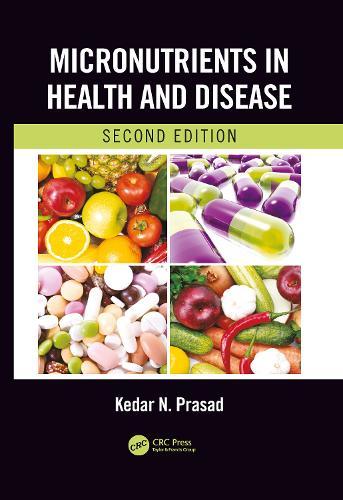Overview
Increased oxidative stress due to the production of excessive amounts of free radicals along with the effects of chronic inflammation plays a major role in the initiation and progression of most chronic diseases. In addition, increased release of glutamate plays a central role in the pathogenesis of various disorders. This second edition of Micronutrients in Health and Disease proposes a novel concept that in order to simultaneously and optimally reduce oxidative stress, chronic inflammation, and glutamate, it is essential to increase levels of antioxidant enzymes as well as levels of dietary and endogenous antioxidant compounds at the same time. This is accomplished by activating the Nrf2 pathways and by increasing the levels of antioxidant compounds and B-vitamins through supplementation. This book proposes a mixture of micronutrients that achieves this above goal. The mixture of micronutrients together with modification in diet and lifestyle may reduce the risk of chronic diseases and in combination with standard care, may improve the management of these diseases. KEY FEATURES • Provides evidence in support of the idea that increased oxidative stress, chronic inflammation, and glutamate are involved in the pathogenesis of chronic diseases. • Contains three new chapters on Huntington’s disease, Autism spectra, and Prion disease. • Discusses the role of microRNAs in the pathogenesis of chronic diseases. • Presents information on regulation of the expression of microRNAs by reactive oxygen species and antioxidants. Micronutrients in Health and Disease, Second Edition serves as a valuable resource for those seeking to promote healthy aging and prevent and improved management of chronic diseases.
Full Product Details
Author: Kedar N. Prasad (Premier Micronutrient Corporation,Novato, California, USA)
Publisher: Taylor & Francis Ltd
Imprint: CRC Press
Edition: 2nd edition
Weight: 1.088kg
ISBN: 9781032093147
ISBN 10: 1032093145
Pages: 560
Publication Date: 30 June 2021
Audience:
Professional and scholarly
,
Professional & Vocational
Format: Paperback
Publisher's Status: Active
Availability: In Print

This item will be ordered in for you from one of our suppliers. Upon receipt, we will promptly dispatch it out to you. For in store availability, please contact us.
Reviews
The book is comprehensive. The coverage ranges from the basic fundamentals of micronutrients with explanations regarding the role of the antioxidant system, oxidative stress, inflammatory responses, and adaptive immunity to the scientific rationale underlying the role of micronutrients in promoting/preventing these biological responses and the mechanisms that underlie them. There is a particularly useful description of the healthy aging process versus the common adverse impact of chronic diseases associated with aging, including rheumatoid and osteoarthritis as well as cardiovascular diseases, diabetes, and cancer. Unique features include a chapter on the role of micronutrients in protecting against lethal doses of ionizing radiation and a concluding chapter listing 17 common misconceptions, the underlying rationale, and the proposed explanation for its misinterpretation.
The book is comprehensive. The coverage ranges from the basic fundamentals of micronutrients with explanations regarding the role of the antioxidant system, oxidative stress, inflammatory responses, and adaptive immunity to the scientific rationale underlying the role of micronutrients in promoting/preventing these biological responses and the mechanisms that underlie them. There is a particularly useful description of the healthy aging process versus the common adverse impact of chronic diseases associated with aging, including rheumatoid and osteoarthritis as well as cardiovascular diseases, diabetes, and cancer. Unique features include a chapter on the role of micronutrients in protecting against lethal doses of ionizing radiation and a concluding chapter listing 17 common misconceptions, the underlying rationale, and the proposed explanation for its misinterpretation.
Author Information
Dr. Kedar N. Prasad obtained a Masters degree in Zoology from the University of Bihar, Ranchi, India, and a Ph.D. degree in Radiation Biology from the University of Iowa, Iowa City, in 1963. He received Post-doctoral training at the Brookhaven National Laboratory, Long Island. New York, and joined the Department of Radiology at the University of Colorado Health Sciences Center where he became Professor and Director for the Center for Vitamins and Cancer Research. He has published over 250 articles in peer-reviewed journals, and authored and edited 25 books in the area of radiation biology, nutrition and cancer, and nutrition and neurological diseases particularly Alzheimer’s disease and Parkinson’s disease. These articles were published in highly prestigious journals such as Science, Nature, and Proceedings of the National Academic of Sciences, USA. Dr Prasad has received several honors which include: Invitation by the Nobel Prize Committee to nominate a candidate for the Nobel Prize in Medicine for 1982; The 1999 Harold Harper Lecture at the meeting of the American College of Advancement in Medicine; An award for the best review of 1998-1999 on antioxidant and cancer; and 1999-2000 on antioxidants and Parkinson’s disease by the American College of Nutrition. He was a Fellow of the American College of Nutrition, and served as a President of the International Society of Nutrition and Cancer, 1992-2000. In 2017, he was invited to become the member of The Royal Society of Medicine, London. Currently, he is Chief Scientific Officer of the Engage Global.




